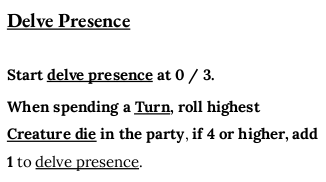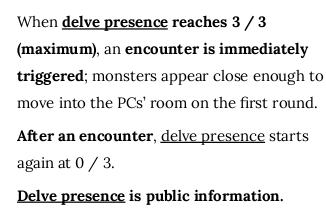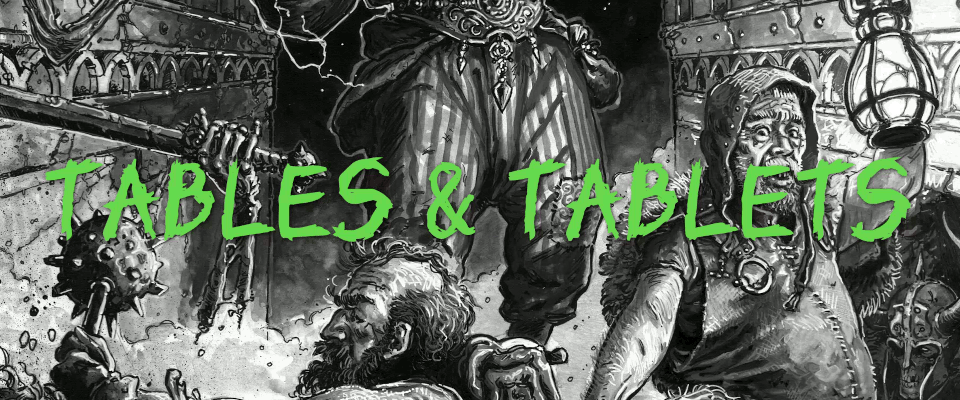No Ballet in Barovia; or, making system match "feel"
How do you get your players to feel what you want them to?
For me, I'm starting to aim to have the rules they're following encourage a certain behaviour; going against that path is an equally interesting choice, but it's still something to work with.
Looking at fifth edition, as an example, it's strange that all of the published adventures -- as far as I know, & I've played a lot of them -- make no modifications to the game to reflect the tone of the story being laid out.
I DM'd Curse of Strahd twice & the second time I added a "dread" mechanic that would effect players; alleviating this dread was a matter of seeking comforts, much like the residents of Barovia do -- it better grounded the campaign in the dreaded domain & they better understood what the folks who lived there went through over time. Thinking back, I wish I had gone one step further & guided players during character creation, saying:
"I don't think Acrobatics, for example, will be an overly useful skill in this campaign. Sure you might find ways to use it it, but I will be leaning into the gothic horror of this adventure as much as possible to provide a unique experience & so I don't see myself calling for that skill".
To do anything else would be a shame. Why use the exact same ruleset & expect a different outcome? Sure, the descriptions of the areas, the monsters, the NPCs flesh out the world, but if players are playing the same game, using the same rules, it's been my experience that the same kind of play ends up happening at the table. I want players to remember how they felt in that world.
I've been having a wicked time reading Slugblaster by Mikey Hamm. This is a game which from the beginning is designed to give players a specific experience, which is guided by the rules. There are no rules of crunchy combat, no stats for monsters, but players can yell "check it!", roll a d6, & possibly perform a cool trick on their hoverboard which might earn them Style.
Is this suitable for running Curse of Strahd with?* I think I can learn from a game like Slugblaster though, & take this back to my regular games -- especially when playing fifth edition or any other "broad" ruleset that in theory covers any kind of game.
Though I still play in a regular fifth edition game, my mind these days is often on Tables & Tablets. So if I had to pick one aspect of the rules of this game to tweak, or re-flavour, hoping to reinforce the "feel" of an adventure, it would be delve presence.


For Abandoned in Bulk, the intro dungeon, delve presence goes very much by the book: when it reaches max, roll for a random encounter. In Blessing to Live, being a one-page dungeon its simpler, partly because I chose other things than an encounter table for the limited space one page gives you: reaching max presence here means gaining the attention of the Queen Bee.
I've been reading & loving the Dungeon Crawler Carl series & what I next want to write is a big nod towards that: a short adventure where the players are very much aware that they're being "viewed" by an audience. I'm glad with the choice of word being "presence" for this mechanic; I'll reframe it to reinforce what I want the players to feel; I can flip the concept of trying to minimise your "presence" in a dungeon, to trying to maximise your "presence" to an audience. Now players want, or even need, to increase this counter if they are to survive -- as more viewers means more reward boxes, & the magic items inside scale off of this same viewership.
Delve presence previously gave players a tangible feeling of their impact in a dungeon, one they can work with & plan around, & now here it's a metric for how cool & exciting their behaviours are to an invisible audience. I want the players to remember this feeling, remember how it changed their PCs' motivations, & all around changed how they felt in the game. The rule change isn't necessary, but it gives the players a new & different lever to push & pull on.
So far I've not adjusted the rules of the game, just how they're interpreted, & perhaps I won't always need to. In this case however what I will change is the rule for resting:
"After a successful rest, the minimum number to increase delve presence (default of 4) is now one less (minimum of 1)."
to:
"After a successful rest, the minimum number to increase delve presence (default of 4) is now one more."
With this, players will need to keep upping their entertainment factor to keep the rewards dropping in on them. Perhaps they get smarter, perhaps more daring, maybe they persevere instead of resting, keeping their viewers attention.
Since this audience-viewed adventure won't take place in a dungeon, rolls against delve presence won't be triggered by a dungeon turn -- by moving into the next unexplored room; instead I'll take inspiration again from Slugblaster & give the players the option to roll when they do something noticeable, all I'll ask is that they describe it, which will root the players in the game & hopefully make it feel unlike a regular crawl at the table.
*Absolutely not, unless you're a gang of teens who got caught in a mist & now want to get footage of the crew grinding the perimeter of Castle Ravenloft, booking it out of there before the old-ass vampire tries to ruin the mood.
Get Tables & Tablets
Tables & Tablets
A role-playing ruleset for dungeon delving.
| Status | Released |
| Category | Physical game |
| Author | Thomas Heslin |
| Tags | Dungeon Crawler, Dungeons & Dragons, OSR, pen-and-paper, rules-lite, Tabletop, tabletop-role-playing-game, Tabletop role-playing game |
| Languages | English |
More posts
- Free 75 page preview now available!22 days ago
- Blessing to Live: Designing a Tablet36 days ago
- Some Monsters of Tablets & Tablets83 days ago
- Origins of Tables & Tablets88 days ago

Leave a comment
Log in with itch.io to leave a comment.